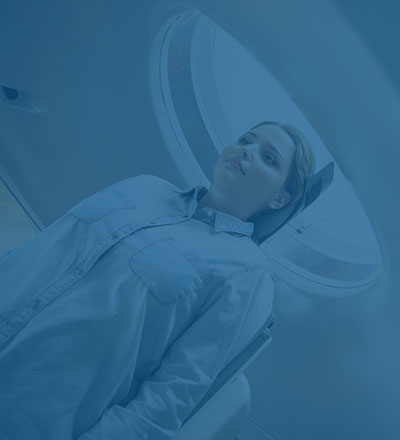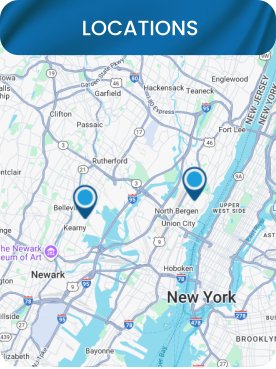MRI Clinic in West New York, and West Hudson, NJ
MRIs are particularly useful for diagnosing the unknown causes of symptoms, confirming diagnoses, and for preventative screening, especially in individuals at high risk for certain conditions. This imaging method is instrumental in improving health outcomes across various conditions by facilitating accurate diagnoses and swift treatment interventions. MRI services are available at Advanced Magnetic Imaging and Advanced Open MRI. For more information, contact us, or request an appointment online. We have convenient locations to serve you in West New York, NJ and West Hudson, NJ.


Table of Contents:
What is an MRI?
Is an open MRI as effective as a closed MRI?
How long does an MRI take?
How do I prepare for an MRI?
What distinguishes an open MRI from a regular MRI?
Magnetic Resonance Imaging (MRI) is a medical imaging technique used to create detailed images of the tissues and organs inside the body. It utilizes a magnetic field and computer-generated radio waves to capture non-invasive images, offering providers a valuable tool for examining tissues, organs, and the skeletal system.
MRIs are particularly useful for diagnosing the unknown causes of symptoms, confirming diagnoses, and for preventative screening, especially in individuals at high risk for certain conditions.
This imaging method is instrumental in improving health outcomes across various conditions by facilitating accurate diagnoses and swift treatment interventions. Common applications include imaging the brain and spinal cord to diagnose tumors, strokes, injuries from trauma, and conditions like multiple sclerosis, aneurysms, and diseases of the eye and inner ear.
MRIs also assess the heart and blood vessels and detect issues across the body, including joint problems, and as a screening tool for early breast cancer detection.
Open and closed MRIs serve similar diagnostic functions but have key differences in design that may make one more suitable than the other, depending on individual patient factors and the specific area being examined.
Closed MRIs, which involve the patient lying in an enclosed capsule, often provide higher-quality images and are preferable for certain types of scans. However, they can cause discomfort or claustrophobia for some patients due to the enclosed space.
Open MRIs, designed with magnets above and below but open on the sides, offer greater comfort and reduce claustrophobia, making them a preferred option for patients with such concerns. Although open MRIs might not be as well-suited for imaging certain body parts as closed MRIs, they can still produce adequate images for many diagnostic purposes.
The duration of an MRI scan varies significantly according to each patient’s specific circumstances, including the area of the body being scanned and the details required for diagnosis.
While the procedure itself employs strong magnetic fields and radio waves to generate detailed internal body images, the time required can vary.
A single scan may last only a few seconds to a few minutes, but multiple scans are often needed for a comprehensive assessment, extending the total procedure time.
Typically, an MRI lasts between 15 minutes and 90 minutes, depending on the complexity of the scans and the number of images needed. Patients are required to remain still during the scan to ensure clear, unblurred images, with the technologist monitoring from outside the scanner.
Minimal preparation is typically required for an MRI, but specific instructions may be provided by our expert team based on the nature of the scan and the area being examined.
Patients are usually able to eat, drink, and take their medication as normal unless advised otherwise. In some cases, abstaining from food or drink for up to four hours before the scan or drinking a large amount of water beforehand may be necessary.
Patients need to discuss their medical history, health concerns, and any claustrophobia or anxiety issues with their provider before the scan. Removing any metal objects is crucial, as the MRI’s magnetic field can interact with metal.
Valuables should ideally be left at home, but secure storage is typically available for necessary personal items. If a contrast agent is used to enhance the images, it may be injected or ingested prior to the scan.
Patients needing sedatives or anesthesia for comfort due to claustrophobia should arrange for transportation, as they will not be able to drive themselves home.
The primary difference between an open MRI and a regular (closed) MRI lies in their design and patient experience. Closed MRIs feature a narrow, tube-like structure where patients lie inside, which can produce high-quality images but may cause discomfort or anxiety, especially in claustrophobic individuals.
Open MRIs, on the other hand, are designed with open sides to alleviate claustrophobia, offering a more comfortable experience for patients apprehensive about enclosed spaces.
While open MRIs can provide quality images for many diagnostic purposes, they may not always match the high-resolution capability of closed MRIs, particularly for certain areas of the body.
The choice between an open and closed MRI ultimately depends on the diagnostic requirement and the patient’s comfort, with providers available to discuss the most appropriate option based on individual needs.
Visit Advanced Magnetic Imaging for MRI services. Contact us for more information. We serve patients from West New York NJ, North Bergen NJ, Union City NJ, Guttenberg NJ, Weehawken NJ, Hoboken NJ, Fort Lee NJ, Englewood NJ, East Rutherford NJ, Jersey City NJ, West Hudson NJ, Newark NJ, Nutley NJ, Secaucus NJ, Belleville NJ, Hoboken NJ, Bloomfield NJ, and the surrounding areas! Book your next appointment now – you will be glad you did! Visit us online for directions to our leading clinic and to meet our team of healthcare professionals.

ADDITIONAL SERVICES YOU MAY NEED




